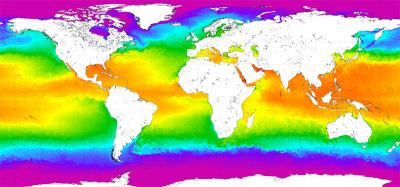
As the world's oceans continue to take in more and more heat, it affects more than just the water. How? Come, let's find out
A new record
The world's oceans, which have absorbed most of the excess heat caused by humanity's carbon pollution, continued to see record-breaking temperatures last year, according to research published recently. The research, published in the journal Advances in Atmospheric Sciences, was based on observations from 24 scientists across 16 institutes worldwide. The study, by researchers in China, the U.S., Italy, and New Zealand, said that 2022 was "the hottest year ever recorded in the world's oceans". Heat content in the oceans exceeded the previous years levels by around 10 Zetta joules-equivalent to 100 times the electricity generation worldwide in 2021. according to the authors. Records going back to the late 1950s show a relentless rise in ocean temperatures with almost continuous increases going back to around 1985.
Why are oceans important?
About half of the world's total amount of oxygen is produced in oceans, through the plants there. Equally importantly, oceans play a crucial role in the climate of the world. They carry the Sun's heat from the Equator to the Poles, thereby regulating our climate and weather patterns. Apart from these, oceans are indispensable for the world economy, through several aspects such as trade, transport, food, medicine, recreational activities, tourism, etc. In fact, the livelihood of millions of people across the globe are dependent on oceans and seas. In addition to all these, oceans are thriving ecosystems, nurturing all kinds of life forms-from the smallest to the largest- within them.
What causes the warming of oceans?
More than two-thirds of our planet's surface is covered by water, and oceans make up a large portion of that. Due to their sheer size, they can absorb heat from the Sun without their temperatures increasing much. Apart from sunlight, oceans receive heat from other sources such as greenhouse gases. But when there's a lot of heat to be absorbed, oceans become warmer with substantial difference in temperature increase. A study has found that over the last few decades, nearly 90% of excess heat from greenhouse gas emissions has been absorbed by the ocean while the rest are absorbed by land, the atmosphere, etc. While land surfaces are protected due to this, it warms oceans to devastating results.
What happens when oceans warm?
Due to thermal expansion, the volume of water increases when it is warm. In addition, warm ocean water melts sea ice and delays ice formation during winter. This is a major reason for global sea-level increase. Extremely high temperatures in the ocean are called marine heatwaves, and they can harm marine creatures. Further, they can affect migration of marine animals, cause coral bleaching, ocean acidification (increase in the waters acidic content due to excessive intake of carbon dioxide from the atmosphere), and deoxygenation (warm water can hold only low amounts of dissolved oxygen). Aspects such as acidification and deoxygenation affect not just marine creatures but also their habitats and ecosystems.
The ocean-land connection
Whatever affects the oceans and seas affects the land too – either directly or indirectly. Warming ocean waters impact how heat is distributed globally. This results in erratic climate and weather patterns, leading to extreme weather events such as drought heat waves, cold waves, wildfires, floods, severe cyclones, etc. As sea levels increase, they can submerge coastal areas, displacing those inhabiting these regions. Further, those dependent on the oceans for their livelihood-for example, fisherfolk- may lose their livelihood if oceans cannot help marine creatures survive. If more and more people choose to leave behind coastal areas threatened thus, it could lead to crowding of non-coastal areas, leaving a society that's constantly in conflict over food space, opportunities, and life itself.
Picture Credit : Google




